|
De Amerikaanse schrijver Stewart O'Nan werd geboren op 4 februari 1961 in Pittsburgh, Pennsylvania. Zie ook alle tags voor Stewart ONan op dit blog.xml:namespace prefix = o ns = "urn:schemas-microsoft-com:office:office" />
Uit: Songs for the Missing
Inside, the a/c was cranked so high she wore a t-shirt under her uniform. They poached old nametags they found in the junk drawer under the register. She was Angie, Nina was Sam. They spun on their stools and watched the monitors, punching in the pump numbers and making change. They read heavy, insane fashion magazines and called around to see what was going on later even though they were on camera too and fought over whose turn it was to refill the nacho pot. Her timecard was in its slot, the clock behind it chunking with every minute, a record of her steadiness. Shed been working seven days a week since graduation and hadnt missed a shift. Later the police would call this strict pattern a contributing factor. Secretly she was proud of it. Shed never been so determined. Shed never had a reason before.
The Conoco was an oasis of light, drawing cars off the highway like the muffleheads that fluttered against the windows. Drivers came in squinting and rubbing their necks, stopping on the mat inside the door as if this was all new to them, and too much, the bright aisles of candies and chips overloading their brains so they couldnt read the sign directly in front of them.
They bkinked at her, apologetic. Where are the?
Straight back.
Fifty, a hundred times a night. She pointed her whole arm like a ghost.
Its true, Nina said. The more you drive, the dumber you get.
Thank you, thank you, Sam I am.
The living death had bad breath. They bought coffee and soda and water, cigarettes and gum, Tootsie Pops and jerky, anything to get them to the next stop. In line they nodded their heads and mouthed the lyrics to the dinosaur pop that played endlessly inside and out, a fiendish commercial-free satellite feed pieced together, it seemed, by U2 and the Doobie Brothers.
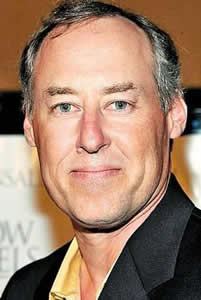
Stewart O'Nan (Pittsburgh, 4 februari 1961)
De Nederlandse dichter en schrijver Louis Ferron werd op 4 februari 1942 geboren in Leiden. Zie ook alle tags voor Louis Ferron op dit blog.
Uit: Tinpest
Kent u de Dorotheeërgasse? Daar komt een officier als Lauersperg eerst goed tot zijn recht. Die straat: een streng gelede woekering van architraven en timpanen, gebeiteld in grauwe zandsteen. Een barokke pracht die Grieks in haar eenvoud wil zijn en van een voornaamheid die niettemin de indruk wekt dat men zich voor een Berlijnse kapperszaak bevindt. Geen sprankje licht heeft in die straat ooit het plaveisel bereikt. Toch babbelen en kirren de passerende dames, op weg naar theesalon of modezaak, er alsof ze door de Augarten flaneren of in het park van de Belvédère. De pastelkleurige, dan wel sneeuwwitte parasols in lichte, kokette draaiing boven hun hoofden, de lange japonnen met de linkerhand en op kniehoogte net even boven het plaveisel geheven.
Het zijn maar beelden uit een oud boek. Maar wie het ooit heeft ingezien, zullen de gravures en lithografieen voor eeuwig... Ach, wat zal men metaforen te hulp roepen waar de pijn knaagt? Liever houde men de blik op Lauersperg gericht die, alle metaforiek omzeilend, zijn nuchtere weg door het leven van zijn tijd ging.
Daar zag hij bijvoorbeeld de vrouw van overste Zaremba met haar vriendin. Rechterhand aan de kepie. En vervolgens niet de burgerlijke buiging voorwaarts, maar de rug daarentegen juist extra gestrekt, voorzover dat bij een in het boksen bedreven officier als Lauersperg nog mogelijk was. Geen uitbundige of familiaire groet, o nee, al had men op bals en soirees menige blik gewisseld. Een kort 'mevrouw overste' en dan een stijve hoofdknik naar de vriendin zodat met het aangename gevoel ervoer van de stijve, staande kraag die als een mes in het vlees onder de kin sneed. De vreugden van het militaire bestaan werden niet uitsluitend op het slagveld of tijdens de manoeuvres ervaren.
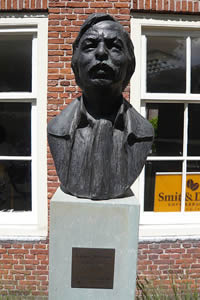
Louis Ferron (4 februari 1942 26 augustus 2005)
Borstbeeld door Bart Holt in Haarlem
De Amerikaanse schrijver Robert Coover werd geboren op 4 februari 1932 in Charles City, Iowa. Zie ook alle tags voor Robert Coover op dit blog.
Uit: Noir
At the door, Michiko, one of the local whores, comes over to flirt with you. Hey, Phil-san, she whispers, wrapping her parchmenty arms around your neck. She uses a body powder that makes you think of an airless hothouse. She looks like she is dressed from head to toe in a densely patterned body stocking, but she is actually wearing only her skin and a thongif thats not a tattoo, too. She leans close to your ear as though to nibble it and whispers: Go out back door, Phil-san. Somebody waiting for you in front. Cmon, baby, she says more loudly, reaching into your pants. Quickie-quickie? Michiko love you!
Michiko was not always a suffocatingly perfumed bag of old painted bones. She had a certain enigmatic Eastern aura when she was younger and worked the snazzier joints. Before that, while she was still just a kid in schoolgirl clothes and white cotton panties (white panties used to be a big deal; you miss those times), she had been the moll of a notorious yakuza gangster who had his own portrait tattooed on the inside of her tender young thighs. Where he could keep an eye on things, he said. A rival gang leader kidnapped her and blinded the portrait with red splotches, and just for good measure added a mustache and blacked out two of the teeth before returning her to her lover. He also had his own hand, recognizable by its dont-fuck-with-me dragon tattoo on the back and the superhero code ring on his pinkie, tattooed over her plucked pubes, the middle finger disappearing between her lips. Her lover responded by sending her back to the rival with the dragon tattoo reduced to a simpering please-fuck-me position, the ring finger chopped to a bloody stub, signifying a humiliating three-knuckled yubizume, and the middle finger blackened as though torched by its impertinence. The lover also tattooed Michikos ears with haikus celebrating the black mist of summer and winters ice-heart, which was a play on his own name, and inked the circles of a target on her buttocks around the bulls-eye anus with the phrase Youre next, asshole! on the right cheek.
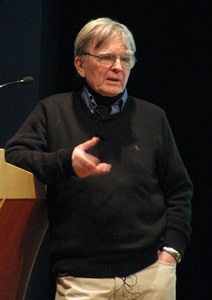
Robert Coover (Charles City, 4 februari 1932)
De Oostenrijkse toneelschrijver Werner Schwab werd geboren in Graz op 4 februari 1958. Zie ook alle tags voor Werner Schwab op dit blog.
Uit: Volksvernichtung oder meine Leber ist sinnlos - Eine Radikalkomödie
Herrmann: Eine schändliche Sau bist du, die mich vor der ganzen Welt davondenken will. Aber einmal wird ein Tag auftauchen, der sich gezwungen sehen wird, in eine Kenntnis hereinzunehmen, dass der Maler Herrmann Wurm in Graz sein Licht erblickt hat und dass er das gleich auf der ganzen Weltoberfläche abgebildet hat. Graz...wird man sagen...und wurm...wird man sagen...und Erfinder der persönlichen Lichtstrahlen...wird man sagen...und Kleinstadt: Grosskunst...wird man sagen...und ganz einfach Grazkunst...wird man vor sich voraussagen. Weil eiene richtige Grazkunst, die ist keine Mausescheisse, die von einem Hund gefressen wird, der dann von einem Lastkraftwagen zusammengeführt werden muss. Und die Grazkunst, die ist aber auch schon überhaupt keine angefressene Leber, die aus einer alkoholisierten Leiche herausgefallen ist...beim Leichenwashen. Und schon gar nicht ist die Grazkunst für nichts zu gebrauchen...
Niemand kann mir Graz aus dem Leben herausnehmen.
Frau Wurm: Aber was ist das dann denn für eine Sorte von einer Kunst, die Grazkunst?
Herrmann: Also die Grazkunst...diese Kunstsorte, das ist, wenn die künstlerischen Menschen ihre Gefühle in der gefühlvollen Stadt...zusammenreissen...also wenn eine Kunstsorte sich einen einmaligen Anfang herausnimmt aus den gefühlvollen Grazmenschen. Das ist so, wie wenn der Herr Hausherr sagt, dass er ein Farbbild hereinbrauchen will für das Kinderzimmer von den Kindern von Graz.
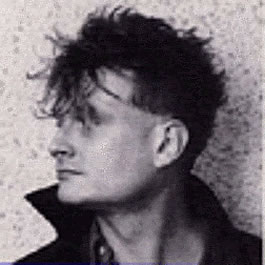
Werner Schwab (4 februari 1958 - 1 januari 1994)
De Canadese dichter E. J. Pratt werd op 4 februari 1882 geboren in Western Bay, Newfoundland. Zie ook alle tags voor E. J. Pratt op dit blog.
Silences
There is no silence upon the earth or under the earth like the silence
under the sea;
No cries announcing birth,
No sounds declaring death.
There is silence when the milt is laid on the spawn in the weeds and
fungus of the rockclefts;
And silence in the growth and struggle for life.
The bonitoes pounce upon the mackerel,
And are themselves caught by the barracudas,
The sharks kill the barracudas
And the great molluscs rend the sharks,
And all noiselessly
Though swift be the action and final the conflict,
The drama is silent.
There is no fury upon the earth like the fury under the sea.
For growl and cough and snarl are the tokens of spendthrifts who
know not the ultimate economy of rage.
Moreover, the pace of the blood is too fast.
But under the waves the blood is sluggard and has the same
temperature as that of the sea.
There is something prereptilian about a silent kill.
Two men may end their hostilities just with their battlecries,
'The devil take you,' says one.
'I'll see you in hell first,' says the other.
And these introductory salutes followed by a hail of gutturals
and sibilants are often the beginning of friendship, for who would
not prefer to be lustily damned than to be halfheartedly blessed?
No one need fear oaths that are properly enunciated, for they
belong to the inheritance of just men made perfect, and, for all we
know, of such may be the Kingdom of Heaven.
But let silent hate be put away for it feeds upon the heart of the hater.
Today I watched two pairs of eyes. One pair was black and the
other grey. And while the owners thereof, for the space of five
seconds, walked past each other, the grey snapped at the black and
the black fiddled the grey.
One looked to say 'The cat,'
And the other 'The cur.'
But no words were spoken;
Not so much as a hiss or a murmur came through the perfect enamel
of the teeth; not so much as a gesture of enmity.
If the right upper lip curled over the canine, it went unnoticed.
The lashes veiled the eyes not for an instant in the passing.
And as between the two in respect to candour of intention or
eternity of wish, there was no choice, for the stare was mutual and
absolute.
A word would have dulled the exquisite edge of the feeling.
An oath would have flawed the crystallization of the hate.
For only such culture could grow in a climate of silence
Away back before emergence of fur or feather, back to the unvocal
sea and down deep where the darkness spills its wash on the
threshold of light, where the lids never close upon the eyes, where
the inhabitants slay in silence and are as silently slain.
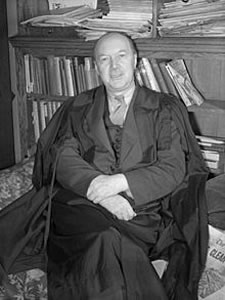
E. J. Pratt (4 februari 1882 26 april 1964)
De Duitse schrijver en journalist Norman Ohler werd geboren op 4 februari 1970 in Zweibrücken. Zie ook alle tags voor Norman Ohler op dit blog.
Uit: Ein großes Stück Wasser (Logbuch)
Weichsel, km 730. Thorun. Die windschiefen Gassen der Geburtsstadt von Kopernikus öffnen sich zum Fluss und lassen Blicke bis zum mittelalterlichen Domplatz hindurch. Doch hier noch nicht anlegen, sondern das Tageslicht voll nutzen. Festmachen zum Sonnenuntergang am Weichselufer km 699. Fische braten am offenen Feuer. Sternenhimmel. Das Murmeln, Plätschern, Glucksen des Flusses. Niemand hat je hier angelegt. Niemand wird es je wieder tun. So fühlt es sich an.
Weichsel, km 520. Die Skyline von Warschau unwirklich schimmernd am Horizont, der Himmel tomatenrot. Von Minute zu Minute wird die Erscheinung realer, Brücken führen über den Fluss, Straßenbahnen fahren darüber. Jugendliche spielen am Ufer Golf: schlagen die Bälle in den Fluss, stellen dies während der Vorbeifahrt der Aton ein. Drei Tage Landgang. Bis hierhin sei die Weichsel noch einigermaßen befahrbar, erzählt ein Fischer im versteckten Hafen nahe der Altstadt. Über den Abschnitt bis nach Krakau könne er nichts sagen. Es gebe zu wenig Informationen. Er denke, dass der niedrige Wasserstand es unmöglich mache, so weit zu kommen.
Weichsel, km 416. Anders als der Rhein wurde die Weichsel nie begradigt und mäandert durch eine Landschaft, die wirkt wie Europa vor Hunderten von Jahren. Mit Höchstgeschwindigkeit von 40 km/h die Kurven ausfahren, durch, wie es scheint, unberührtes Gebiet. Kein Tempolimit. Keine Kontrollen. Keine Regeln. Und dann mit Vollgas, weil ein Uferzeichen verpasst, in eine Sandbank hinein: ein beinahe erhebendes Gefühl. Das ganze Boot wird sanft vom Sande aufgenommen, gleitet wie auf einer großen Hand. Dann ruckt es böse, Tassen und Teller fliegen vom Tisch, der Honda ist aus.
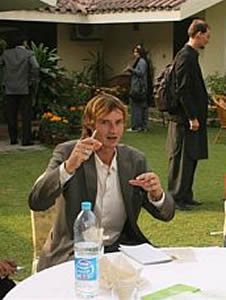
Norman Ohler (Zweibrücken, 4 februari 1970)]
De Duitse schrijver Alfred Andersch werd geboren op 4 februari 1914 in München. Zie ook alle tags voor Alfred Andersch op dit blog.
Uit: Sansibar oder der letzte Grund
Genauso sind wir in der Lenin-Akademie gesessen, und genauso haben wir gelesen, gelesen, gelesen. Vielleicht haben wir die Arme dabei aufgestützt, vielleicht haben wir Papirossi dabei geraucht - obwohl das nicht erwünscht war -, vielleicht haben wir manchmal aufgeblickt, - aber wir haben den Glockenturm Iwan Weliki* vor dem Fenster nicht gesehen, ich schwöre es, dachte Gregor, so versunken waren wir. So versunken wie er. Er ist wir.
Wie alt ist er? So alt, wie wir waren, als wir genauso lasen. Achtzehn, höchstens achtzehn. Gregor bückte sich tiefer, um dem jungen Mann gänzlich ins Gesicht sehen zu können. Er trägt unser Gesicht, dachte er, das Gesicht unserer Jugend, das Gesicht der Jugend, die ausgewählt ist, die Texte zu lesen, auf die es ankommt. Aber dann bemerkte er auf einmal, daß der junge Mann ganz anders war. Er war gar nicht versunken. Er war nicht einmal an die Lektüre hingegeben. Was tat er eigentlich? Er las ganz einfach. Er las aufmerksam. Er las genau. Er las sogar in höchster Konzentration. Aber er las kritisch. Er sah aus, als wisse er in jedem Moment, was er da lese. Seine Arme hingen herab, aber sie schienen bereit, jeden Augenblick einen Finger auf den Text zu führen, der zeigen würde: das ist nicht wahr. Das glaube ich nicht. Er ist anders, dachte Gregor, er ist ganz anders. Er ist leichter, als wir waren, vogelgleicher. Er sieht aus wie einer, der jederzeit das Buch zuklappen kann und aufstehen, um etwas ganz anderes zu tun.
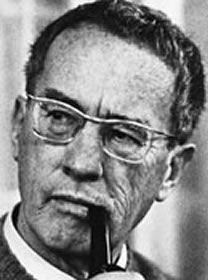
Alfred Andersch (4 februari 1914 21 februari 1980)
Zie voor nog meer schrijvers van de 4e februari ook mijn blog van 4 februari 2011 deel 2.
|



